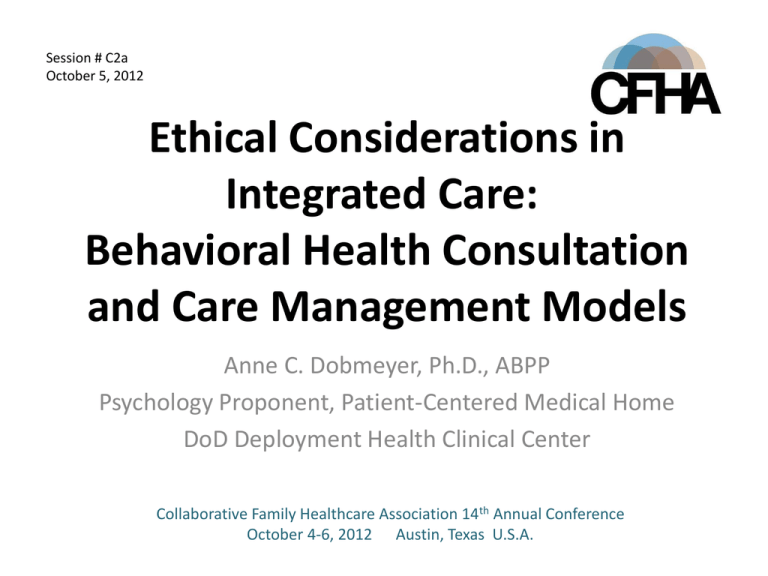Ethical Considerations in Integrated Care
advertisement

Session # C2a October 5, 2012 Ethical Considerations in Integrated Care: Behavioral Health Consultation and Care Management Models Anne C. Dobmeyer, Ph.D., ABPP Psychology Proponent, Patient-Centered Medical Home DoD Deployment Health Clinical Center Collaborative Family Healthcare Association 14th Annual Conference October 4-6, 2012 Austin, Texas U.S.A. Faculty Disclosure I have not had any relevant financial relationships during the past 12 months. The views expressed herein are those of the author and do not necessarily represent the official policy or position of the DoD Deployment Health Clinical Center, Walter Reed National Military Medical (WRNMMC), Department of Defense (DoD), or the United States Government. Objectives • Identify common ethical dilemmas in behavioral health consultation in primary care • Describe ethical challenges that may be encountered in care management models • Analyze professional codes of ethics to assist with resolving such ethical dilemmas • Discuss whether current ethical standards adequately address these common ethical dilemmas in integrated primary care settings Learning Assessment A learning assessment is required for CE credit. There will be opportunity for Question & Answer periods during and at the conclusion of this presentation. Outline • Overview: Two models of integration – Primary care behavioral health (PCBH) model – Care management (CM) model • Ethical challenges: Examples and guidance • Application: Participant discussion of scenario PCBH Overview • Behavioral health consultant (BHC) integrated into primary care (PC) • Functions as consultant to PC team – PCP remains “in charge” of overall care plan – BHC provides recommendations to PCP and patients • Provides focused assessment and intervention – 15 to 30 minute appointments – 1 to 4 appointments • Sees wide range of BH and medical problems Strosahl, 1998; Robinson & Reiter, 2007 CM Overview • Care manager (CM), often a nurse or masters’ level provider, integrated into primary care (PC) • Enhances continuity of care for discrete problem area (e.g., depression, obesity) • Follows patients over time – Assesses progress/symptom changes – Identifies and addresses barriers to adherence – Obtains consultation from BH specialist – Communicates with PCP, who adjusts care plan Oxman et al., 2002; Barry & Oxman, 2008 Ethical Question #1: PCBH “I’ve never worked in a PCBH model before. But I’ve provided psychotherapy for years, and have read one of the books on PCBH. I’m ready-to-go, right?” Ethical Domain: Competence APA Standard 2 Boundaries of Competence 2.01 (e) (e) In those emerging areas in which generally recognized standards for preparatory training do not yet exist, psychologists nevertheless take reasonable steps to ensure the competence of their work and to protect clients/patients, students, supervisees, research participants, organizational clients, and others from harm. NASW 1.04 Competence (c) When generally recognized standards do not exist with the respect to an emerging area of practice, social workers should exercise careful judgment and take responsible steps (including appropriate education, research, training, consultation, and supervision) to ensure the competence of their work and to protect clients from harm. Ethical Domain: Competence • PCBH can be considered an emerging practice area, without clearly defined professional guidelines for training and education • How can one determine appropriate training and consultation to practice competently in new area? – Professional literature – Position papers/statements from professional organizations – Relevant listserv discussions – Special Interest Group recommendations Ethical Domain: Competence • In the field, growing acceptance that specific clinical training is needed to develop PCBH skills • Publications describing training approaches Strosahl, 2005; Dobmeyer et al., 2003 • Development of established programs – Internship training – Externship training – Certificate programs (e.g., 36 to 80 CE hours) Ethical Question #2: PCBH & CM “Isn’t it an ethical violation to document my PCBH (or CM) appointments in a shared electronic medical record? Isn’t this inappropriate disclosure of confidential patient information?” Ethical Domain: Privacy APA Standard 4.04 Minimizing Intrusions on Privacy (a): “Psychologists include in written and oral reports and consultations, only information germane to the purpose for which the communication is made” NASW Standard 2.05 Consultation (c): “When consulting with colleagues about clients, social workers should disclose the least amount of information necessary to achieve the purposes of the consultation” Ethical Domain: Privacy American Nurses Association (ANA) Code of Ethics Provision 3.2 Confidentiality: “…the nurse’s responsibility to provide quality care require that relevant data be shared with those members of a health care team who have a need to know.” “Only information pertinent to a patient’s treatment and welfare is disclosed” Ethical Domain: Informed Consent APA 3.10 Informed Consent (a) When psychologists conduct research or provide assessment, therapy, counseling, or consulting services in person or via electronic transmission or other forms of communication, they obtain the informed consent of the individual or individuals using language that is reasonably understandable to that person or persons except when conducting such activities without consent is mandated by law or governmental regulation or as otherwise provided in this Ethics Code. Informed Consent & Privacy PCMH Informed Consent Process: Mandatory Verbal and written formats Consistent with primary care setting Describes handling of patient information Discussions with PCP Documentation in medical record Other limits of confidentiality Ethical Question #3: CM “Our Care Facilitator is a general registered nurse, not a psychiatric nurse. I’m concerned about whether its ethical for him to be assessing and managing suicidal patients in our Care Management program for depression.” Ethical Domain: Competence ANA Provision 4.3 Responsibility for Nursing Judgment and Action: “When the needs of the patient are beyond the qualifications and competence of the nurse, consultation and collaboration must be sought from qualified nurses, other health care professionals, or appropriate sources.” Ethical Domain: Competence • CM program should include risk management protocols – Designed to be administered by nurse – Accompanied by training – Assisted by consultation/supervision – Supported by immediate referral options Ethical Question #4: PCBH Participant Discussion “I’m concerned that PCBH brief assessment and intervention (one to four 30-minute appointments) is unethical because I’m not meeting standard of care” “Isn’t this substandard care?” Ethical Question #4: PCBH Standard of Care To meet Specialty BH standards of care for assessment and treatment, what would our practice likely entail? Ethical Question #4: PCBH Standard of Care Without the addition of PCBH in primary care… To meet primary care standards of care for assessment and treatment of BH condition, what would practice likely entail? Ethical Question #4: PCBH Informed Consent NASW 1.03 Informed Consent (a) Social workers should provide services to clients only in the context of a professional relationship based, when appropriate, on valid informed consent. Social workers should use clear and understandable language to inform clients of the purpose of the services, risks related to the services… reasonable alternatives, client’s right to refuse or withdraw consent, and the timeframe covered by the consent… Ethical Question #4: PCBH Beneficence & Service APA Principle A Beneficence: “Psychologists strive to benefit those with whom they work and take care to do no harm” NASW Core Social Work Value Service: “Social workers’ primary goal is to help people in need and address social problems” References Barry, S. L., & Oxman, T. E. (2008). Three-component model for primary care management of depression and PTSD (Military version): RESPECT-Mil care facilitator reference manual, 3CM, LLC. Dobmeyer, A. C., Rowan, A. B., Etherage, J. R., & Wilson, R. J. (2003). Training psychology interns in primary behavioral health care. Professional Psychology: Research and Practice, 34, 586-594. Oxman, T. E., Dietrich, A. J., Williams, J. W. Jr., & Kroenke, K. (2002). A three-component model for reengineering systems for the treatment of depression in primary care. Psychosomatics, 43, 441-450. References Strosahl, K. D. (1998). Integrating behavioral health and primary care services: the primary mental health care model. In A. Blount (Ed.), Integrated primary care: The future of medical and mental health collaboration (pp. 139-166). New York: Norton. Strosahl, K. D. (2005). Training behavioral health and primary care providers for integrated care: A core competencies approach. In W. T. O’Donohue, M. R. Byrd, N. A. Cummings, & D. A. Henderson (Eds.,), Behavioral integrative care: Treatments that work in primary care settings (pp. 15- 52). New York: Brunner-Routledge. Anne C. Dobmeyer, Ph.D., ABPP Psychology Proponent, Patient-Centered Medical Home DoD Deployment Health Clinical Center Defense Centers of Excellence anne.c.dobmeyer@health.mil (301) 312-1876 Session Evaluation Please complete and return the evaluation form to the classroom monitor before leaving this session. Thank you!








